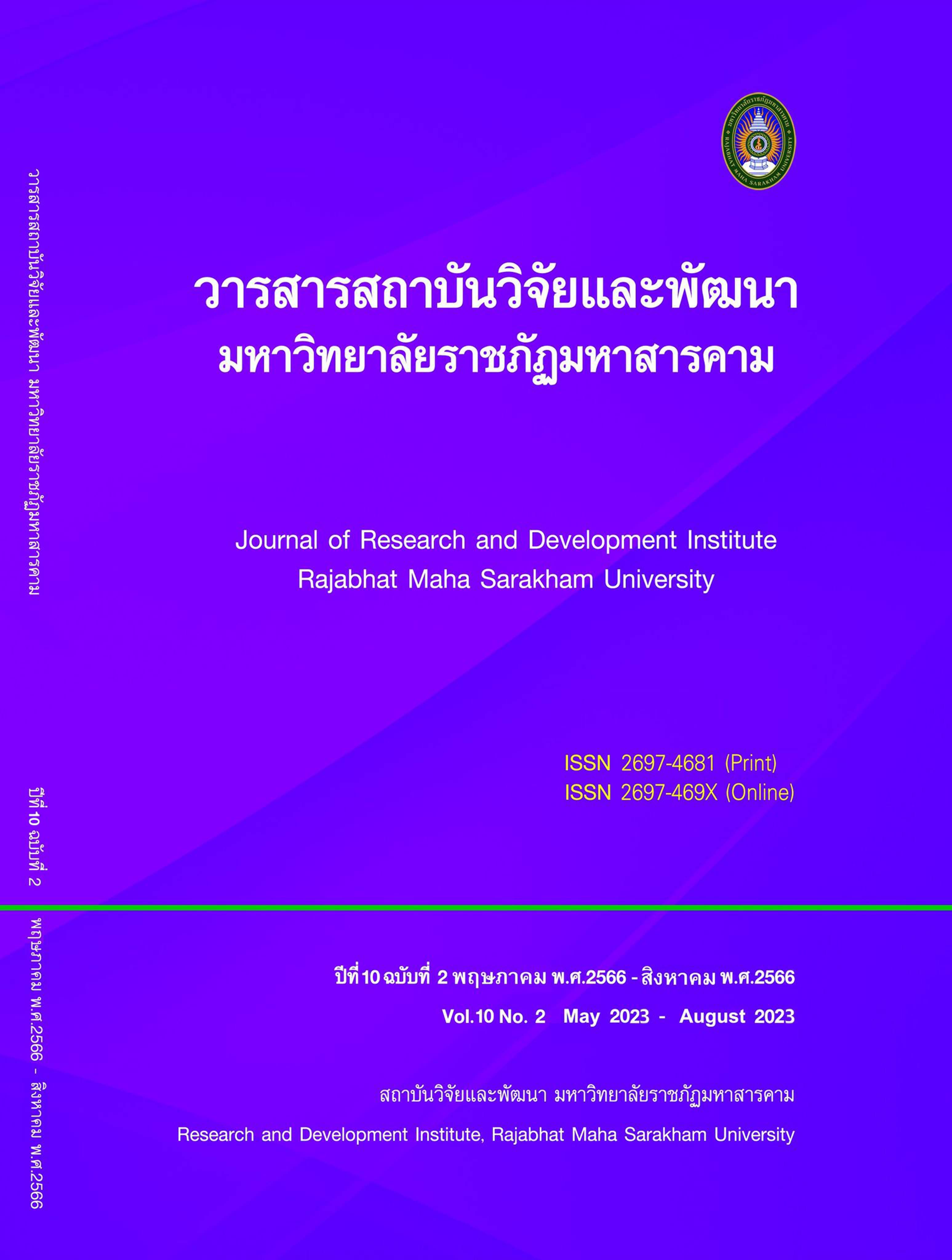Enhancing the English vocabulary skill of kindergarten learners using phonics instruction with learning through play
Keywords:
English vocabulary skill, phonics instruction, learning through playAbstract
The aims of this study were 1) to develop English vocabulary skill of the kindergarten level three learners through phonics instruction with learning through play, and 2) to study learners’ attitudes towards the phonics instruction with learning through play. The present study utilized 14 kindergarten learners of Ban Srisuk School, the primary educational service area office Khon Kaen 5, Khon Kaen province, Thailand, and was selected through random-purposive sampling. Furthermore, this study employed a pre-experimental, quantitative type of research involving a one-group of pre- and post-test design. The following research instruments used to collect data were pre- and pos- English vocabulary tests and the questionnaire on learners’ attitudes towards learning English using phonics instruction with learning through play. The descriptive data analysis used were percentage, means, and standard deviation, which were used to compare English vocabulary pre-test and post-test after two weeks using t-test, whilst the inferential analysis used was the paired t-test to determine whether there is a significance difference between the learners’ pre- and post-test results in English vocabulary skill after using the intervention.
Results from the study revealed that there was a significance difference between the pre-test (x=10.86 and S.D.=2.70) and post-test (x=15.57 and S.D.=3.77) at .01 level of significance after the instruction of phonics with learning through play was provided on them. In addition, the percentage of the kindergarten learners’ attitudes towards learning English using phonics instruction with learning through play was 93.7%. These results confirm that using phonics instruction with learning through play enhanced young learners’ English vocabulary skill.
In conclusion, the studied findings have provided significance supported for the intervention and used of those approach. To be included these as a useful pedagogical approach, not only to enhance the young learners’ vocabulary skill, but also to promoted positive attitudes towards leaning English.
References
Aiyarakarnjanakul, W. (2018). Effects of phonics instruction on reading ability of young Thai learners. Thammasat University.
Akbar, H., Fatima, H., & Aslam, N. (2020). Developing phonics through activity based learning at early years. Journal of Early Childhood Care and Education, 23-35.
Anantao, A. (2018). The development of English pronunciation skill of grade 5 students using brain-based learning with phonics method. Khon Kaen University.
Blevins, W. (2006). Phonics from A to Z: A Practical Guide, Grades K-3. Scholastic Professional Books.
Cheep-Aranai, R. (2016). The development of play-based language learning activities to enhance oral language skills of young EFL learners. Chulalongkorn University.
Cheep-Aranai, R., & Chukaeo, O. (2018). Young learners' attitudes towards classroom materials design in play-based language learning course. International Journal of Learning and Teaching, 195-202.
Cheep-Aranai, R., & Wasanasomsithi, P. (2016). Learners's voices and positive affective outcomes regarding play-based language learning. Journal of Language Teaching and Learning in Thailand, 133-167.
Cutter-Mackenzie, A., & Edwards, S. (2013). Toward a model for early childhood environmental education: Foregrounding, developing, and connecting knowledge through play-based learning. The Journal of Environmental Education, 195-213.
Deerajviset, P. (2014). The ASEAN Community 2015 and English language teaching in Thailand. Journal of Humanities and Social Sciences, 39-75.
Karimkhanlooei, G., & Seifiniya, H. (2015). Teaching alphabet, reading and writing for kids between 3-6 years old as a second language. Social and Behavioral Sciences, 769-777.
Lewis, M., & Ellis, S. (2006). Phonics: Practice, research and policy. Sage.
Ministry of Education. (2008). The Basic Education Core Curriculum B.E. 2551. Kurusapa Ladprao Publishing.
Noltemeyer, A. L., Joseph, L. M., & Kunesh, C. E. (2019). Effects of supplemental small group phonics instruction on kindergartners' word recognition performance. Reading Improvement, 149-160.
Paisart, W. (2017). A case study of learning vocabulary through pictures. Thammasat University.
Phanich, W. (2012). The method of leaning construction for learners in 21st century. Tathata Publication.
Sethi, D. (2013). Effects of synthetic phonics instruction using play based language learning on English word recognition ability of kindergarten learners in bilingual school. Chulalongkorn University.
Sitthitikul, P. (2014). Theoretical review of phonics instruction for struggling/beginning readers of english. Journal of language Teaching and Learning in Thailand, 113-126.
Smith, P. K., & Pellegrini, A. (2008). Learning through. Encyclopedia on early childhood development, 61.
Suriyamonthon, N. (2018). Using phonics method to promote English pronunciation and vocabulary knowledge among grade 1 students. Nakhon Phanom University Journal, 117-124.
Thoma, J. (2021). A model of professional development on phonics instruction: a case study of one midwestern district. Journal of Education, 3-9.
Thongprom, S. (2018). Effects of phonics video-based lessons on Pratomsuksa three students' spelling ability at Banphukaolad School. Khon Kaen University.
Toonsiri, R. (2020). Using phonics method to promote English pronunciation ability and vocabulary knowledge among mathayom suksa 1 students. Journal of Education Naresuan University, 185-198.
Wichayut, J. (2019). The effects of phonics instruction: letters and sounds on decoding and blending skills of Thai grade 3 students. Thammasat University.
Downloads
Published
How to Cite
Issue
Section
License
Copyright (c) 2023 ศุภาลัย อาจนนลา, องอาจ นามวงศ์, Roderick Julian Robillos

This work is licensed under a Creative Commons Attribution-NonCommercial-NoDerivatives 4.0 International License.
Articles that are published are copyrighted by the authors of the articles







